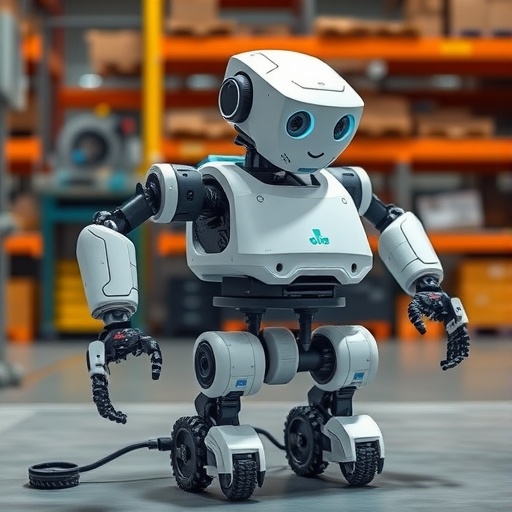In a groundbreaking advancement for green chemistry, researchers at Universitat Jaume I (UJI) have unveiled Reac-Discovery, a revolutionary robotic platform combining artificial intelligence, automation, and 3D printing to vastly accelerate the development of sustainable chemical processes. This innovative digital system minimizes the time traditionally required for catalytic reactor design from months or years to just days, signaling a paradigm shift in how chemical reactions can be optimized for industrial and environmental benefit.
The urgency to harmonize industrial productivity with environmental responsibility has spawned numerous efforts to exploit carbon dioxide, a prevalent greenhouse gas, as a beneficial feedstock for creating polymers, fine chemicals, and pharmaceuticals. Leveraging CO2 transforms a major climate change culprit into a valuable resource, reducing greenhouse emissions and the chemical industry’s reliance on unsustainable fossil raw materials. It is exactly within this critical context that UJI’s Reac-Discovery platform emerges as a powerful tool, enabling researchers to navigate the complex chemistry involved in such transformative reactions with unprecedented speed and precision.
At the core of Reac-Discovery lies a semi-automated digital framework that integrates three principal modules: Reac-Gen, Reac-Fab, and Reac-Eval. Reac-Gen utilizes computational design algorithms to digitally conceive reactor geometries optimized for specific catalytic reactions. These digitally-defined architectures are then fabricated in high-resolution detail via Reac-Fab, a cutting-edge 3D printing system that produces reactors featuring sophisticated open-cell structures and interconnected pores. This geometric innovation enhances mass and heat transfer far beyond the capabilities of conventional reactor designs, underpinning the advancement of Industry 5.0 principles by fusing digital manufacturing with sustainability.
The final module, Reac-Eval, operates as an autonomous laboratory where catalytic performance is evaluated in real-time. Equipped with artificial intelligence and machine learning algorithms, Reac-Eval monitors multiple reaction parameters simultaneously and iteratively adjusts conditions to maximize productivity and efficiency. This real-time feedback loop of data analysis and experimental control not only dramatically reduces resource consumption but also generates rich scientific data critical for scaling and adapting processes to varied industrial needs.
Conventionally, catalytic reactor development is a notoriously painstaking process involving labor-intensive experimentation, manual data collection, and subjective interpretation of results. Reac-Discovery obviates these inefficiencies by seamlessly automating experiment design, execution, and analysis. Its ability to self-optimize reaction conditions on the fly accelerates discovery cycles and enables researchers to iterate rapidly on reactor configurations and catalytic parameters without human intervention.
Notably, the platform’s success is exemplified by its application to the hydrogenation of acetophenone — a reaction integral to pharmaceutical and specialty chemicals manufacturing. Furthermore, Reac-Discovery demonstrated remarkable efficacy in the catalytic conversion of CO2 into cyclic carbonates, compounds essential as electrolytes and precursors for sustainable polycarbonate materials. These case studies prove the system’s versatility and promise for addressing diverse chemical transformations central to the circular economy and sustainable chemical production.
The integration of AI, robotics, and advanced manufacturing embodied by Reac-Discovery positions Universitat Jaume I at the forefront of the sustainable chemistry revolution. By harnessing these technologies to streamline and enhance continuous-flow catalysis, the research team illustrates a compelling model for how future chemical research and industrial processes can become vastly more efficient, ecologically responsible, and economically viable.
The publication of this research in the prestigious journal Nature Communications underscores the scientific community’s recognition of this leap forward. The article entitled “Reac-Discovery: an artificial intelligence–driven platform for continuous-flow catalytic reactor discovery and optimization” details the cutting-edge methodologies and computational modeling underpinning the platform’s development, inviting widespread adoption and further innovation.
This achievement aligns squarely with the emerging vision of Industry 5.0, where human creativity synergizes with intelligent machines to drive sustainable industrial transformation. By designing reactors that optimize catalytic activity and selectivity through digital twin simulations, followed by rapid fabrication and autonomous testing, the platform encapsulates how digital technologies can catalyze breakthroughs in green chemistry.
By drastically reducing the timeline for catalytic reactor discovery and optimization, Reac-Discovery not only expedites scientific progress but also sharply curtails the environmental footprint associated with chemical R&D. This breakthrough heralds a new era wherein laboratories worldwide are equipped to explore complex reaction landscapes methodically, resource-efficiently, and with unparalleled speed.
Ultimately, Reac-Discovery exemplifies the confluence of multidisciplinary innovation—spanning chemical engineering, artificial intelligence, robotics, and additive manufacturing—poised to redefine the sustainability roadmap for the chemical industry. Its broad potential impacts extend beyond academia to industrial sectors striving toward net-zero emissions and circular economy goals, signaling an inspiring blueprint for future technological integration.
As the chemical industry intensifies its search for greener pathways, platforms like Reac-Discovery are indispensable in transforming visionary concepts into tangible processes that preserve ecosystems while sustaining human development. The Universitat Jaume I team, through this pioneering work, offers a luminous example of how intelligent automation can accelerate humanity’s transition to a resilient, sustainable future.
Subject of Research: Sustainable chemical process design using AI-driven catalytic reactor optimization
Article Title: Reac-Discovery: an artificial intelligence–driven platform for continuous-flow catalytic reactor discovery and optimization
News Publication Date: 13-Oct-2025
Web References: https://doi.org/10.1038/s41467-025-64127-1
References: Published in Nature Communications
Image Credits: INAM-UJI of Castelló
Keywords
Artificial intelligence, robotic automation, 3D-printed catalytic reactors, sustainable chemistry, carbon dioxide utilization, continuous-flow catalysis, machine learning, Industry 5.0, green manufacturing, digital reactor design, catalytic reactor optimization, circular economy




